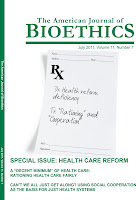The Continuing Debate on Stem Cell Research
 Judge Rejects Stem-Cell Suit
Judge Rejects Stem-Cell SuitMark H. Anderson and Maya Jackson-Randall
Wall Street Journal
July 27, 2011
The appeals court also determined that the National Institutes of Health had reasonably concluded government funding for embryonic-stem-cell research isn't prohibited by a 1996 law that bars the use of federal money for research in which an embryo is destroyed.
Link: Podcast, Stem Cells: The Ethics Debate Begins Anew, Glenn McGee, PhD, August 27, 2010
Labels: PhD, stem cell research; medical ethics; bioethics; Glenn McGee






